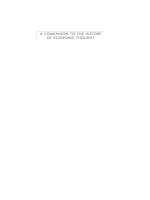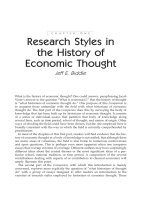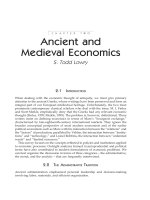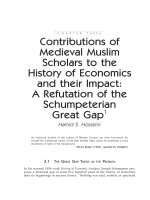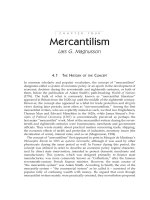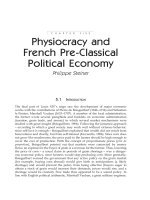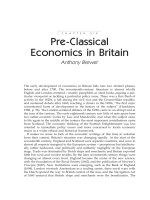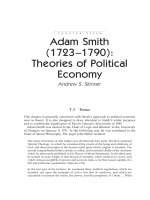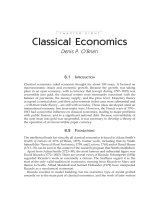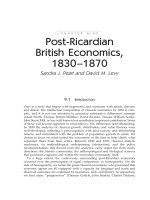Macroeconomics and the history of economic thought
Bạn đang xem bản rút gọn của tài liệu. Xem và tải ngay bản đầy đủ của tài liệu tại đây (6.02 MB, 431 trang )
Macroeconomics and the History of Economic
Thought
The essays in this Festschrift have been chosen to honour Harald Hagemann and his scientific work.
They reflect his main contributions to economic research and his major fields of interest. The book is
subdivided into three parts.
The essays in the first part deal with various aspects within the history of economic thought. All
reflect Hagemann’s interest in the question of how economic knowledge and ideas migrate between
countries (mainly through émigrés) and in time (by studying the history of ideas). New aspects of the
lives and works of well-known and lesser-known economists are presented by excellent historians of
economic thought. Some essays are related to economic debates of the inter-war period, reflecting
Hagemann’s research focus on the years of high theory, especially in the field of business cycle
theory.
The second part is about the current state of macroeconomics, which is critically examined in
many of the essays. Several of them relate to the global financial crisis, and discuss why the current
consensus view in macroeconomics faces fundamental problems in understanding its causes and
consequences, in contrast to earlier economists such as Irving Fisher and John Maynard Keynes.
Further essays set the focus on the problems of money illusion and understanding inflation.
The essays in the third part of the book cover topics on economic growth and structural dynamics.
Most of them look at the Schumpeterian triangle of innovation, competition and institutions from
different perspectives, dealing with such topical issues as the emergence of new sectors, market
definition in technologically dynamic systems, innovation strategies in global manufacturing, offshore
outsourcing and the consequences of soft budget constraints.
Hagen M. Krämer is Professor of Economics at the Karlsruhe University of Applied Sciences,
Germany.
Heinz D. Kurz is Professor of Economics at the University of Graz, Austria.
Hans-Michael Trautwein is Professor of International Economics at the Carl von Ossietzky
University of Oldenburg, Germany.
Routledge studies in the history of economics
1 Economics as Literature
Willie Henderson
2 Socialism and Marginalism in Economics 1870–1930
Edited by Ian Steedman
3 Hayek’s Political Economy
The socio-economics of order
Steve Fleetwood
4 On the Origins of Classical Economics
Distribution and value from William Petty to Adam Smith
Tony Aspromourgos
5 The Economics of Joan Robinson
Edited by Maria Cristina Marcuzzo, Luigi Pasinetti and Alesandro Roncaglia
6 The Evolutionist Economics of Léon Walras
Albert Jolink
7 Keynes and the ‘Classics’
A study in language, epistemology and mistaken identities
Michel Verdon
8 The History of Game Theory, Volume 1
From the beginnings to 1945
Robert W. Dimand and Mary Ann Dimand
9 The Economics of W. S. Jevons
Sandra Peart
10 Gandhi’s Economic Thought
Ajit K. Dasgupta
11 Equilibrium and Economic Theory
Edited by Giovanni Caravale
12 Austrian Economics in Debate
Edited by Willem Keizer, Bert Tieben and Rudy van Zijp
13 Ancient Economic Thought
Edited by B. B. Price
14 The Political Economy of Social Credit and Guild Socialism
Frances Hutchinson and Brian Burkitt
15 Economic Careers
Economics and economists in Britain 1930–1970
Keith Tribe
16 Understanding ‘Classical’ Economics
Studies in the long-period theory
Heinz Kurz and Neri Salvadori
17 History of Environmental Economic Thought
E. Kula
18 Economic Thought in Communist and Post-Communist Europe
Edited by Hans-Jürgen Wagener
19 Studies in the History of French Political Economy
From Bodin to Walras
Edited by Gilbert Faccarello
20 The Economics of John Rae
Edited by O. F. Hamouda, C. Lee and D. Mair
21 Keynes and the Neoclassical Synthesis
Einsteinian versus Newtonian macroeconomics
Teodoro Dario Togati
22 Historical Perspectives on Macroeconomics
Sixty years after the ‘General Theory’
Edited by Philippe Fontaine and Albert Jolink
23 The Founding of Institutional Economics
The leisure class and sovereignty
Edited by Warren J. Samuels
24 Evolution of Austrian Economics
From Menger to Lachmann
Sandye Gloria
25 Marx’s Concept of Money
The God of Commodities
Anitra Nelson
26 The Economics of James Steuart
Edited by Ramón Tortajada
27 The Development of Economics in Europe since 1945
Edited by A. W. Bob Coats
28 The Canon in the History of Economics
Critical essays
Edited by Michalis Psalidopoulos
29 Money and Growth
Selected papers of Allyn Abbott Young
Edited by Perry G. Mehrling and Roger J. Sandilands
30 The Social Economics of Jean-Baptiste Say
Markets and virtue
Evelyn L. Forget
31 The Foundations of Laissez-Faire
The economics of Pierre de Boisguilbert
Gilbert Faccarello
32 John Ruskin’s Political Economy
Willie Henderson
33 Contributions to the History of Economic Thought
Essays in honour of R. D. C. Black
Edited by Antoin E. Murphy and Renee Prendergast
34 Towards an Unknown Marx
A commentary on the manuscripts of 1861–63
Enrique Dussel
35 Economics and Interdisciplinary Exchange
Edited by Guido Erreygers
36 Economics as the Art of Thought
Essays in memory of G. L. S. Shackle
Edited by Stephen F. Frowen and Peter Earl
37 The Decline of Ricardian Economics
Politics and economics in post-Ricardian theory
Susan Pashkoff
38 Piero Sraffa
His life, thought and cultural heritage
Alessandro Roncaglia
39 Equilibrium and Disequilibrium in Economic Theory
The Marshall–Walras divide
Michel de Vroey
40 The German Historical School
The historical and ethical approach to economics
Edited by Yuichi Shionoya
41 Reflections on the Classical Canon in Economics
Essays in honour of Samuel Hollander
Edited by Sandra Peart and Evelyn Forget
42 Piero Sraffa’s Political Economy
A centenary estimate
Edited by Terenzio Cozzi and Roberto Marchionatti
43 The Contribution of Joseph Schumpeter to Economics
Economic development and institutional change
Richard Arena and Cecile Dangel
44 On the Development of Long-run Neo-classical Theory
Tom Kompas
45 F. A. Hayek as a Political Economist
Economic analysis and values
Edited by Jack Birner, Pierre Garrouste and Thierry Aimar
46 Pareto, Economics and Society
The mechanical analogy
Michael McLure
47 The Cambridge Controversies in Capital Theory
A study in the logic of theory development
Jack Birner
48 Economics Broadly Considered
Essays in honour of Warren J. Samuels
Edited by Steven G. Medema, Jeff Biddle and John B. Davis
49 Physicians and Political Economy
Six studies of the work of doctor-economists
Edited by Peter Groenewegen
50 The Spread of Political Economy and the Professionalisation of Economists
Economic societies in Europe, America and Japan in the nineteenth century
Massimo Augello and Marco Guidi
51 Historians of Economics and Economic Thought
The construction of disciplinary memory
Steven G. Medema and Warren J. Samuels
52 Competing Economic Theories
Essays in memory of Giovanni Caravale
Sergio Nisticò and Domenico Tosato
53 Economic Thought and Policy in Less Developed Europe
The nineteenth century
Edited by Michalis Psalidopoulos and Maria-Eugenia Almedia Mata
54 Family Fictions and Family Facts
Harriet Martineau, Adolphe Quetelet and the population question in England 1798–1859
Brian Cooper
55 Eighteenth-Century Economics
Peter Groenewegen
56 The Rise of Political Economy in the Scottish Enlightenment
Edited by Tatsuya Sakamoto and Hideo Tanaka
57 Classics and Moderns in Economics, Volume I
Essays on nineteenth and twentieth century economic thought
Peter Groenewegen
58 Classics and Moderns in Economics, Volume II
Essays on nineteenth and twentieth century economic thought
Peter Groenewegen
59 Marshall’s Evolutionary Economics
Tiziano Raffaelli
60 Money, Time and Rationality in Max Weber
Austrian connections
Stephen D. Parsons
61 Classical Macroeconomics
Some modern variations and distortions
James C. W. Ahiakpor
62 The Historical School of Economics in England and Japan
Tamotsu Nishizawa
63 Classical Economics and Modern Theory
Studies in long-period analysis
Heinz D. Kurz and Neri Salvadori
64 A Bibliography of Female Economic Thought to 1940
Kirsten K. Madden, Janet A. Sietz and Michele Pujol
65 Economics, Economists and Expectations
From microfoundations to macroeconomics
Warren Young, Robert Leeson and William Darity Jnr.
66 The Political Economy of Public Finance in Britain, 1767–1873
Takuo Dome
67 Essays in the History of Economics
Warren J. Samuels, Willie Henderson, Kirk D. Johnson and Marianne Johnson
68 History and Political Economy
Essays in honour of P. D. Groenewegen
Edited by Tony Aspromourgos and John Lodewijks
69 The Tradition of Free Trade
Lars Magnusson
70 Evolution of the Market Process
Austrian and Swedish economics
Edited by Michel Bellet, Sandye Gloria-Palermo and Abdallah Zouache
71 Consumption as an Investment
The fear of goods from Hesiod to Adam Smith
Cosimo Perrotta
72 Jean-Baptiste Say and the Classical Canon in Economics
The British connection in French classicism
Samuel Hollander
73 Knut Wicksell on Poverty
No place is too exalted
Knut Wicksell
74 Economists in Cambridge
A study through their correspondence 1907–1946
Edited by M. C. Marcuzzo and A. Rosselli
75 The Experiment in the History of Economics
Edited by Philippe Fontaine and Robert Leonard
76 At the Origins of Mathematical Economics
The Economics of A. N. Isnard (1748–1803)
Richard van den Berg
77 Money and Exchange
Folktales and reality
Sasan Fayazmanesh
78 Economic Development and Social Change
Historical roots and modern perspectives
George Stathakis and Gianni Vaggi
79 Ethical Codes and Income Distribution
A study of John Bates Clark and Thorstein Veblen
Guglielmo Forges Davanzati
80 Evaluating Adam Smith
Creating the wealth of nations
Willie Henderson
81 Civil Happiness
Economics and human flourishing in historical perspective
Luigino Bruni
82 New Voices on Adam Smith
Edited by Leonidas Montes and Eric Schliesser
83 Making Chicago Price Theory
Milton Friedman–George Stigler correspondence, 1945–1957
Edited by J. Daniel Hammond and Claire H. Hammond
84 William Stanley Jevons and the Cutting Edge of Economics
Bert Mosselmans
85 A History of Econometrics in France
From nature to models
Philippe Le Gall
86 Money and Markets
A doctrinal approach
Edited by Alberto Giacomin and Maria Cristina Marcuzzo
87 Considerations on the Fundamental Principles of Pure Political Economy
Vilfredo Pareto (Edited by Roberto Marchionatti and Fiorenzo Mornati)
88 The Years of High Econometrics
A short history of the generation that reinvented economics
Francisco Louçã
89 David Hume’s Political Economy
Edited by Carl Wennerlind and Margaret Schabas
90 Interpreting Classical Economics
Studies in long-period analysis
Heinz D. Kurz and Neri Salvadori
91 Keynes’s Vision
Why the great depression did not return
John Philip Jones
92 Monetary Theory in Retrospect
The selected essays of Filippo Cesarano
Filippo Cesarano
93 Keynes’s Theoretical Development
From the tract to the general theory
Toshiaki Hirai
94 Leading Contemporary Economists
Economics at the cutting edge
Edited by Steven Pressman
95 The Science of Wealth
Adam Smith and the framing of political economy
Tony Aspromourgos
96 Capital, Time and Transitional Dynamics
Edited by Harald Hagemann and Roberto Scazzieri
97 New Essays on Pareto’s Economic Theory
Edited by Luigino Bruni and Aldo Montesano
98 Frank Knight & the Chicago School in American Economics
Ross B. Emmett
99 A History of Economic Theory
Essays in honour of Takashi Negishi
Edited by Aiko Ikeo and Heinz D. Kurz
100 Open Economics
Economics in relation to other disciplines
Edited by Richard Arena, Sheila Dow and Matthias Klaes
101 Rosa Luxemburg and the Critique of Political Economy
Edited by Riccardo Bellofiore
102 Problems and Methods of Econometrics
The Poincaré lectures of Ragnar Frisch 1933
Edited by Olav Bjerkholt and Ariane Dupont-Keiffer
103 Criticisms of Classical Political Economy
Menger, Austrian economics and the German historical school
Gilles Campagnolo
104 A History of Entrepreneurship
Robert F. Hébert and Albert N. link
105 Keynes on Monetary Policy, Finance and Uncertainty
Liquidity preference theory and the global financial crisis
Jorg Bibow
106 Kalecki’s Principle of Increasing Risk and Keynesian Economics
Tracy Mott
107 Economic Theory and Economic Thought
Essays in honour of Ian Steedman
John Vint, J Stanley Metcalfe, Heinz D. Kurz, Neri Salvadori and Paul Samuelson
108 Political Economy, Public Policy and Monetary Economics
Ludwig von Mises and the Austrian tradition
Richard M. Ebeling
109 Keynes and the British Humanist Tradition
The moral purpose of the market
David R. Andrews
110 Political Economy and Industrialism
Banks in Saint-Simonian economic thought
Gilles Jacoud
111 Studies in Social Economics
By Leon WalrasTranslated by Jan van Daal and Donald Walker
112 The Making of the Classical Theory of Economic Growth
By Anthony Brewer
113 The Origins of David Hume’s Economics
By Willie Henderson
114 Production, Distribution and Trade
Edited by Adriano Birolo, Duncan Foley, Heinz D. Kurz, Bertram Schefold and Ian Steedman
115 The Essential Writings of Thorstein Veblen
Edited by Charles Camic and Geoffrey Hodgson
116 Adam Smith and the Economy of the Passions
By Jan Horst Keppler
117 The Analysis of Linear Economic Systems
Father Maurice Potron’s pioneering works
Translated by Christian Bidard and Guido Erreygers
118 A Dynamic Approach to Economic Theory: Frisch
Edited by Olav Bjerkholt and Duo Qin
119 Henry A. Abbati: Keynes’ Forgotten Precursor
Serena Di Gaspare
120 Generations of Economists
David Collard
121 Hayek, Mill and the Liberal Tradition
Edited by Andrew Farrant
122 Marshall, Marshallians and Industrial Economics
Edited by Tiziano Raffaelli
123 Austrian and German Economic Thought
Kiichiro Yagi
124 The Evolution of Economic Theory
Edited by Volker Caspari
125 Thomas Tooke and the Monetary Thought of Classical Economics
Matthew Smith
126 Political Economy and Liberalism in France
The contributions of Frédéric Bastiat
Robert Leroux
127 Stalin’s Economist
The economic contributions of Jenö Varga
André Mommen
128 E.E. Slutsky as Economist and Mathematician
Crossing the limits of knowledge
Vincent Barnett
129 Keynes, Sraffa, and the Criticism of Neoclassical Theory
Essays in honour of Heinz Kurz
Neri Salvadori and Christian Gehrke
130 Crises and Cycles in Economic Dictionaries and Encyclopaedias
Edited by Daniele Besomi
131 General Equilibrium Analysis: A Century After Walras
Edited by Pascal Bridel
132 Sraffa and Modern Economics, Volume I
Edited by Roberto Ciccone, Christian Gehrke and Gary Mongiovi
133 Sraffa and Modern Economics, Volume II
Edited by Roberto Ciccone, Christian Gehrke and Gary Mongiovi
134 The Minor Marshallians and Alfred Marshall: An Evaluation
Peter Groenewegen
135 Fighting Market Failure
Collected essays in the Cambridge tradition of economics
Maria Cristina Marcuzzo
136 The Economic Reader
Edited by Massimo M. Augello and Marco E. L. Guido
137 Classical Political Economy and Modern Theory
Essays in honour of Heinz Kurz
Neri Salvadori and Christian Gehrke
138 The Ideas of Ronald H. Coase
Lawrence W.C. Lai
139 Anticipating the Wealth of Nations
Edited by Maren Jonasson and Petri Hyttinen, with an Introduction by Lars Magnusson
140 Innovation, Knowledge and Growth
Edited by Heinz D. Kurz
141 A History of Homo Economicus
The nature of the moral in economic theory
William Dixon and David Wilson
142 The Division of Labour in Economics
A history
Guang-Zhen Sun
143 Keynes and Modern Economics
Edited by Ryuzo Kuroki
144 Macroeconomics and the History of Economic Thought
Festschrift in honour of Harald Hagemann
Edited by Hagen M. Krämer, Heinz D. Kurz and Hans-Michael Trautwein
Macroeconomics and the History of Economic
Thought
Festschrift in honour of Harald Hagemann
Edited by Hagen M. Krämer, Heinz D. Kurz, and Hans-Michael
Trautwein
First published 2012
by Routledge
2 Park Square, M ilton Park, Abingdon, Oxon OX14 4RN
Simultaneously published in the USA and Canada
by Routledge
711 Third Avenue, New York, NY 10017
Routledge is an imprint of the Taylor & Francis Group, an informa business
© 2012 Hagen M . Krämer, Heinz D. Kurz and Hans-M ichael Trautwein
The rights of Hagen M . Krämer, Heinz D. Kurz and Hans-M ichael Trautwein to be identified as the authors of the editorial material, and of the contributors for their
individual chapters, has been asserted in accordance with sections 77 and 78 of the Copyright, Designs and Patents Act 1988.
All rights reserved. No part of this book may be reprinted or reproduced or utilised in any form or by any electronic, mechanical, or other means, now known or
hereafter invented, including photocopying and recording, or in any information storage or retrieval system, without permission in writing from the publishers.
Trademark notice: Product or corporate names may be trademarks or registered trademarks, and are used only for identification and explanation without intent to
infringe.
British Library Cataloguing in Publication Data
A catalogue record for this book is available from the British Library
Library of Congress Cataloging in Publication Data
M acroeconomics and the history of economic thought : festschrift in
honour of Harald Hagemann / edited by Hagen M . Krämer, Heinz D.
Kurz, and Hans-M ichael Trautwein.
p. cm.
Includes bibliographical references.
1. M acroeconomics. 2. Economics. 3. Economists. I. Hagemann, Harald. II. Krämer, Hagen. III. Kurz, Heinz-Dieter. IV. Trautwein,
Hans-M ichael, 1957–
HB172.5.M 33547 2012
339–dc23
2011042275
ISBN: 978-0-415-68147-6 (hbk)
ISBN: 978-0-203-12173-3 (ebk)
Contents
List of figures and tables
Notes on contributors
1 Harald Hagemann at 65: An introduction
HAGEN M. KRÄMER, HEINZ D. KURZ AND HANS-MICHAEL TRAUTWEIN
PART I
The history of economic thought
2 The idea of development in German economics
BERTRAM SCHEFOLD
3 Ricardo on gross and net revenue
CHRISTIAN GEHRKE
4 Friedrich Engels: The architect of Marxism as a science
RAGIP EGE
5 Walras and Pareto on the connection between the trade cycle and General Equilibrium Theory
PASCAL BRIDEL
6 Competing monetary explanations of macroeconomic instability before 1936
DAVID LAIDLER
7
The Austrian economists and academic politics in the inter-war period: A preliminary
investigation
HANSJÖRG KLAUSINGER
8 Ingvar Svennilson and the Kaldor–Verdoorn Law
MAURO BOIANOVSKY
9 Highlights on the Cambridge School: The Italian connection
PIER LUIGI PORTA
10 How ideas migrate
EARLENE CRAVER
11 Wandering thoughts on the migration of knowledge
AXEL LEIJONHUFVUD
12
A slender trunk and many branches: The history of economic thought in perspective, past and
future
MARIA CRISTINA MARCUZZO
PART II
The current state of macroeconomics
13 The crisis in macroeconomics
GEOFF HARCOURT
14 Modern macroeconomics and Keynes: Some sketchy reflections
VOLKER CASPARI
15 A historical, theoretical and empirical perspective on inflation targeting
PHILIP ARESTIS
16 ‘To use the words of Keynes …’: Olivier J. Blanchard on Keynes and the ‘liquidity trap’
INGO BARENS
17 Debt-deflation, balance sheet recession and the recent financial crisis
PETER KALMBACH
18
Sinn after Böhm-Bawerk: Income distribution, capital flows and current account imbalances in
EMU
HAGEN M. KRÄMER AND PETER SPAHN
19 The problem of money illusion in economics
GEORG ERBER
20 Some notes on understanding inflation
EDWARD J. NELL
21 Inflation – a barrier to high employment?
JÜRGEN KROMPHARDT
PART III
Economic growth and structural dynamics
22 Some thoughts about trend and cycle
STEPHAN SEITER
23 Structural economic dynamics: Decisions, methods and theories
ROBERTO SCAZZIERI
24 Economic rationality and the emergence of institutions: A Schumpeterian view
RICHARD ARENA
25
Innovation, institutions and competition: A reflection on the contribution of the Soft Budget
Constraint approach
MURIEL DAL-PONT LEGRAND
26 Economic development – more creation than destruction
ANDREAS PYKA AND PIER-PAOLO SAVIOTTI
27
Market definition in technologically dynamic markets: An example from mobile
telecommunications
ULRICH SCHWALBE AND TONE ARNOLD
28 International innovation strategies and evolutionary dynamics in global manufacturing
ALEXANDER GERYBADZE
29 Classical and neoclassical theories of offshore outsourcing
DEBORAH WINKLER AND WILLIAM MILBERG
30
Theoretical foundations of modern macroeconomic policies in a small open economy: The case
of Norway
THEO SCHEWE
31 How to realize sustainable growth
MICHAEL VON HAUFF
32 Harald Hagemann: a preliminary bibliography, 1975–2011
Name index
Subject Index
Figures and tables
Figures
12.1 JEL codes of articles in HOPE, JHET and EJHET, 2000–09.
16.1 Ineffectiveness of monetary policy.
17.1 Financial surplus or deficit by sector (% of nominal GDP)
18.1 Long-term interest rates in selected EMU countries
18.2 Excessive capital imports and the bubble
18.3
Germany’s current account balance (CA), capital account balance (CB, +: capital inflow) and
its difference (D) vis-à-vis the GIPS countries (Greece, Ireland, Portugal, Spain) and Italy
18.4
Gross investment and saving in GIPS, German capital export to and capital balance with GIPS
(+: capital outflow)
18.5
German private gross investment, total capital balance and capital balance with GIPS (+:
capital outflow)
18.6 Net external position of the Bundesbank in EMU
21.1 Rates of inflation and unemployment, Germany
21.2 Rates of inflation and unemployment, France
21.3 Rates of inflation and unemployment, Italy
21.4 Rates of inflation and unemployment, Spain
21.5 Rates of inflation and unemployment, UK
21.6 Rates of inflation and unemployment, USA
26.1 (a) Number of firms. (b) Intensity of competition
26.2 (a) Demand, (b) Maximum demand, (c) Adjustment gap
26.3 Aggregate employment curve
26.4 The number of firms Nitin different sectors of the economic system
26.5
Income (bold curve), consumption expenditures (dotted curve), total investment (thin curve),
consumption expenditures + total investment (grey curve)
26.6 Demand in different sectors
(a) Product quality, as measured by the services supplied by a product (Yi) in the low-quality
26.7 (thin curve) or high-quality (bold curve) case. (b) Effect of product quality on sectoral
demand. (c) Effect of product quality on sectoral output
26.8
(a) Effect of product quality on sectoral wages. (b) Effect of product quality on the quantity of
human capital used in a sector
26.9
(a) Effect of product quality on the quality of human capital used in a sector. (b) Effect of
product quality on the income created in a sector
26.10 Effect of product quality on the aggregate rate of employment growth
26.11 Effect of product quality on the aggregate rate of income growth
26.12 Changing average incomes with increasing importance of quality
28.1 Evolutionary strategies in manufacturing industries.
28.2 New strategies for fast-track high-tech development.
28.3 Ranking of ‘top five-’ and ‘next five-’ manufacturing locations
28.4 Ranking of ‘top five-’ and ‘next five-’ manufacturing 1990–2007 (based on value added)
28.5
Ranking of leading nations in computers and office machinery 1990–2007 (based on value
added)
28.6
Ranking of leading nations in communications and semiconductors 1990–2007 (based on
value-added)
28.7 Cost of development for high-tech, medium-tech and low-tech industries
28.8 The German pattern of leadership in manufacturing and innovation
29.1 Integrated versus fragmented production
29.2 Trade and the Profit Rate in Ricardo’s Corn Model
30.1 Unemployment in Norway, Denmark, Sweden and OECD Europe 1993–2010 (in per cent)
30.2 Nominal and real wage growth in Norway 1962–2010 (in per cent per year)
Tables
2.1 Economic styles and Klock’s descriptive program
8.1 Factors affecting the introduction of technical innovations
12.1 Articles in HOPE, JHET and EJHET, 1993–2006
17.1
Net lending/borrowing of non-financial business and households in the USA, 2005–10 (billions
of dollars)
21.1 Econometric results
23.1 Resilience and structural economic dynamics
28.1 The structure of world manufacturing industries 1985–2005
28.2 High-tech manufacturing value-added 1990–2007
28.3 Comparative growth in knowledge-intensive business services
Contributors
Richard Arena is professor of economics at the University of Nice–Sophia Antipolis and at
GREDEG-CNRS; his fields of interest are: business cycle theory, industrial economics, economic
philosophy and history of economic thought – in particular, Austrian economics.
Philip Arestis is director of research at the Cambridge Centre for Economics and Public Policy,
University of Cambridge, UK, and professor of economics at the University of the Basque Country,
Spain; his fields of interest are: monetary economics, macroeconomics, applied econometrics and
applied political economy.
Tone Arnold is senior lecturer in economics at the University of Hohenheim; her fields of interest
are: game theory, club formation and industrial economics.
Ingo Barens is professor of economics at the Technical University of Darmstadt; his fields of interest
are: macroeconomics, Keynes and the Keynesians, and the economics of higher education.
Mauro Boianovsky is professor of economics at the University of Brasília, Brazil; his fields of
interest are: history of economic thought, particularly of macroeconomics, monetary theory and
development economics.
Pascal Bridel is professor of political economy at the University of Lausanne; his fields of interest
are: general equilibrium theory, monetary theory and history of economic thought, in particular
Marshall, Keynes, Walras and Pareto.
Volker Caspari is professor of economics at the Technical University of Darmstadt; his fields of
interest are: general equilibrium theory, growth theory and Keynesian economics.
Earlene Craver is historian and economist, retired from the University of California Los Angeles;
her fields of interest are: history of academic emigration, and Austrian economics
Muriel Dal-Pont Legrand is senior lecturer in economics at the University of Nice–Sophia Antipolis
and researcher at GREDEG-CNRS; her fields ofinterest are: growth and finance, business cycle
theory and history of economic thought.
Ragip Ege is professor of economics at the University Louis Pasteur, Strasbourg; his fields of
interest are: economic history, particularly Ancient Greece and the Ottoman Empire; philosophy,
and history of economic thought.
Georg Erber is research associate at DIW Berlin, the German Institute for Economic Research; his
fields of interest are: industrial organization in ICT sectors, economics of networks and regulation
of network industries, and growth and productivity measurement.
Christian Gehrke is associate professor of economics at the University of Graz; his fields of interest
are: growth theory, analysis of structural change, and history of economic thought.
Alexander Gerybadze is professor of international management at the University of Hohenheim,
Stuttgart; his fields of interest are: evolutionary models of innovation, R&D strategies and location
decisions in multinational corporations, standardization consortia and intellectual property
protection.
Geoff Harcourt is emeritus reader in the history of economic theory, University Cambridge;
professor emeritus, Adelaide; and visiting professorial fellow at the University of New South
Wales; his fields of interest are: Keynes and other Cambridge economists, capital theory, income
distribution and employment.
Peter Kalmbach is professor emeritus of economics, University of Bremen; his fields of interest are:
economic growth, income distribution, structural change and history of economic thought.
Hansjörg Klausinger is associate professor at Vienna University of Economics and Business; his
fields of interest are: the history of economic thought, with a focus on twentieth century thought,
and Austrian economics.
Hagen M. Krämer is professor of economics at Karlsruhe University of Applied Sciences; his fields
of interest are: income distribution, European integration, the history of economic thought, and the
structural change towards service economies.
Jürgen Kromphardt is professor emeritus of economics, Technical University of Berlin, and former
member of the German council of economic advisors; his fields of interest are: business cycles,
growth and employment, and methods and history of economics.
Heinz D. Kurz is professor of economics at the University of Graz; his fields of interest are
numerous, but in particular: capital theory, renewable and exhaustible natural resources, input–
output analysis, and Ricardian and Sraffian economics.
David Laidler is professor emeritus of economics, University of Western Ontario, London, Ontario;
his fields of interest are: monetary theory, macroeconomics and history of economic thought.
Axel Leijonhufvud is professor emeritus of economics, University of California, Los Angeles, and
University of Trento; his fields of interest are: macroeconomics, monetary theory, history of
economic thought, and European economic history.
Maria Cristina Marcuzzo is professor of political economy at the University of Rome, ’La
Sapienza’; her fields of interest are: Keynes, Cambridge Economics, and the history of economic
ideas.
William Milberg is professor of economics at the New School for Social Research, New York; his
fields of interest are: international trade, economics of innovation, corporate finance, and the
history and methodology of economics.
Edward J. Nell is Malcolm B Smith Professor at the New School for Social Research, New York;
his fields of interest are: transformational growth, income distribution, and monetary theory.
Pier Luigi Porta is professor of Economics at the University of Milano-Bicocca; his fields of interest
are: welfare economics, history of economic thought and analysis, the Classical School, and civil
economy.
Andreas Pyka is professor of innovation economics at the University of Hohenheim, Stuttgart; his
fields of interest are: Schumpeterian economics, structural change, agent-based modelling, and
